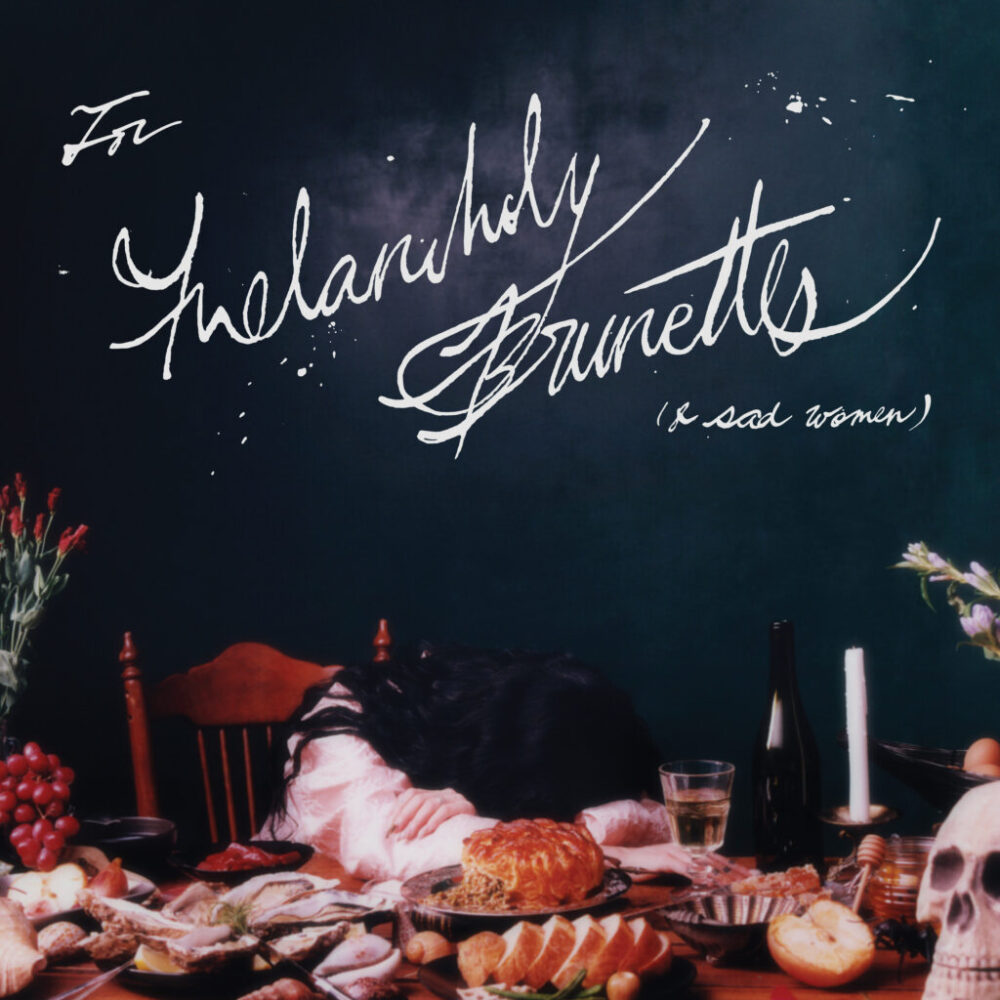Japanese Breakfast – For Melancholy Brunettes (& sad women) (Dead Oceans)
Few artists have navigated the intersection of grief, nostalgia, and reinvention as deftly as Michelle Zauner. As the creative force behind Japanese Breakfast, she has built a discography defined by emotional depth, sonic ambition, and cinematic quality.
Her 2016 debut, Psychopomp, was a raw and intimate exploration of loss following her mother’s passing, its lo-fi textures amplifying its confessional nature. This was followed by Soft Sounds from Another Planet (2017), which reframed grief through cosmic imagery and spacious dream-pop. While her mainstream breakthrough record Jubilee (2021) moved towards joy and grand arrangements, For Melancholy Brunettes (& Sad Women) is a return to introspection—this time with the weight of experience and refinement. Zauner continues to resist easy classification, with songs floating between alt-folk, baroque pop, and post-rock creating a work that defies genre.
This album is grounded in literature, drawing from classical mythology, poetic storytelling, and existential reflection. Leda explicitly references Greek mythology, evoking Yeats’ Leda and the Swan to explore power, fate, and destruction, “The men, they all played to get what they want.” Similarly, Orlando in Love considers identity and transformation, mirroring the Virginia Woolf novel’s themes of metamorphosis and time’s effect on love. The album’s storytelling is both intricate and personal, and deeply embedded in a broader cultural and historical framework.
Mortality and existential contemplation run through Picture Window, an upbeat yet lyrically stark reflection on death. Zauner asks, “Do you not conceive of my death at every minute while your life just passes you by?” This kind of stark awareness lingers across the record, particularly in its depictions of drinking, which appears as both a refuge and a curse. Here Is Someone captures this tension with “Last night’s drinks bring on your morning tremors,” while Honey Water extends the metaphor into temptation and excess, “The lure of honey water draws you from my arms so needy… insatiable for a nectar, drinking till your heart expires.” Alcohol in these songs becomes a symbol of indulgence, regret, and emotional dependency.
Zauner explores the weight of expectations in relationships, capturing their emotional toll. In Winter in LA, she expresses this burden with the line, “I wish you had a happier woman, one that could leave the house.” The theme recurs in Honey Water, where resignation sets in, “They say only love can change a man, but all that changes is me.” These songs’ self-examination underscore the unspoken burdens carried within relationships.
The album’s sonic richness balances delicate minimalism with expansive arrangements. Stripped-back acoustic performances from Rough Trade East, available on YouTube, highlight the strong core of these songs before the addition of strings, brass, and layered instrumentation elevates them. Blake Mills, known for his work with Perfume Genius and Weyes Blood, provides production, and musicianship, that adds depth and impact, enhancing the album’s themes of emotional turmoil, relationship expectations, and memory without overwhelming them.
The album opens with Here Is Someone, an eerie and unpredictable piece that unsettles before resolving into ethereal clarity, Zauner’s voice drifting over shifting instrumentals. This disorientation gives way to the steady, enveloping arrangement of Orlando in Love, which sways between minor-key unease and the comfort of strings, echoing the song’s themes of devotion and longing. Honey Water, in contrast, is propulsive and drum-driven, its sense of movement reflecting the restless emotional terrain Zauner maps out. The brass flourishes add an almost processional quality, reinforcing her talent for cinematic composition.
Mega Circuit is one of the album’s most immediately playful and groove-driven tracks, with a light, swinging rhythm that suggests ease. Yet beneath this relaxed exterior, Zauner’s sharp social commentary cuts through, with references to “incel eunuchs” and “deep in the soft hearts of young boys so pissed off and jaded.” The contrast between the song’s buoyant feel and its dark, disillusioned lyrics make it all the more unsettling.
Men in Bars, featuring Jeff Bridges, embodies a winding, whiskey-warm sadness. The interplay between their voices, Bridges’ weathered timbre and Zauner’s delicate delivery, creates a dynamic that feels like a conversation between past and present, wisdom and yearning, and shared regret, “Even when it breaks apart, it’s ours.”
Zauner’s melancholy is particularly evident in the album’s final moments. Winter in LA builds tension through sweeping instrumental shifts, reflecting the push and pull between outward appearance and inner turmoil. Finally, Magic Mountain closes the record in meditative reflection, its delicate strings and chiming tones subtly recalling Here Is Someone. This sonic return suggests not resolution, but an ongoing cycle and an acceptance that these themes will continue to echo, just as life itself does. The final line, “Bury me beside you in the shadow of my mountain,” delivers a haunting, poetic close, underscoring the album’s themes of memory, devotion, and the weight of the past.
With For Melancholy Brunettes (& Sad Women), Zauner affirms her place as one of today’s most versatile and visionary artists. As a songwriter, memoirist (Crying in H Mart), and director of her own videos, she has built a body of work that extends far beyond music. Where she goes next – including, but not limited to, literature, film, or further sonic experimentation – remains an open and exhilarating question.
John Bradbury
Japanese Breakfast – For Melancholy Brunettes (& sad women) is out now on Dead Oceans
